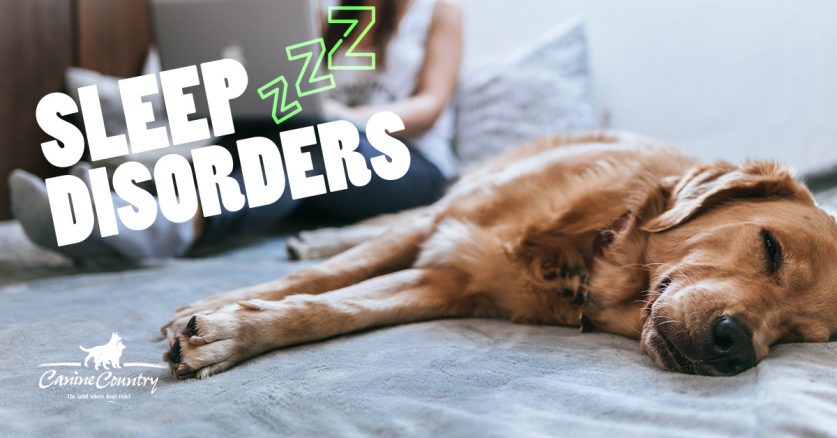
Sleep Disorders in Dogs
Posted Jan 31, 2020 in Health & Safety
Through a combination of daytime naps and nighttime snoozing, your adult dog should be getting around 12 to 14 hours of sleep. If your canine isn’t getting the amount of sleep they need, it can put a massive dent in their mental and physical health. If your furry friend is suffering from a sleeping disorder, they’ll most likely show signs of distraught by whining or crying. During the day, your pup will most likely seem sluggish, disoriented, and even aggressive. This is due to the buildup of stress hormones from sleep deprivation. And on top of all of that, Fido will experience a weakened immune system – increasing their risk of infection. So due to all of these troubling facts, it’s essential you know the symptoms of the most prevalent sleep disorders in dogs as well as what you can do to treat them.
Narcolepsy
A disorder that affects mostly young pups due to a genetic disorder, narcolepsy, is a nervous system sleep disorder. It’s caused by abnormally low levels of hypocretin (a chemical that helps maintain an alert mind and regular sleep patterns). Narcolepsy can also be brought on due to obesity, inactivity, and immune system dysfunction. If your furry friend has narcolepsy, they’ll seemingly collapse out of nowhere. These episodes will most likely occur after something exciting or involving a high amount of energy happens. After that, Fido’s muscles will become limp, and they’ll appear to be in REM sleep. Your pooch is not stuck in this state, though, as any abrupt loud noise or petting will almost instantly wake them up.
As a pet parent, you can rest easy knowing narcolepsy is not life-threatening or painful to your pup. The downside, though, is it’s not a curable disorder. But if managed properly, you can minimize the events that trigger these episodes. Depending on the severity of Fido’s disorder, some medications can help manage the disorder in various ways. If you suspect your pooch is living with narcolepsy, try to catch one of their episodes on video so you can show your vet. Be sure to also come with any symptoms your canine is suffering from. Just in case Fido’s vet wants to recommend medication.
Insomnia
Insomnia tends to be found rarely in dogs and is usually an indication of another serious health issue. Your pooch could be experiencing pain from arthritis or an injury, constant itching from fleas, or massive anxiety and stress that has led to their insomnia. This can be a huge problem, because like mentioned above, if your dog isn’t getting a healthy amount of sleep, it can cause them a tremendous amount of health issues. Taking your pooch to the vet should be your first action if you suspect your dog is suffering from insomnia. They’ll be able to determine what may be causing this issue and recommend the appropriate treatment. Fido’s vet may prescribe a medication, suggest an increase in exercise, or even advise you to create a more comfortable sleep environment.
Sleep Apnea
Another generally rare sleeping disorder your pooch may be experiencing is sleep apnea. However, in obese dogs or flat-faced breeds such as the English bulldog or pug, this disorder is common. When a dog is suffering from sleep apnea, they’ll jolt awake for around 15 seconds at a time. This can cause constant interruptions in their sleep patterns. These interruptions will leave your dog feeling tired and lethargic all day long. If your canine companion tends to frequently snore loudly, this can be a sign they are suffering from sleep apnea. Left untreated, this condition can be life-threatening, so you should bring it to your vet’s attention if you have any suspicions. If diagnosed, your four-legged friend’s treatment may consist of weight loss, surgery, or steam humidifiers – all depending on the reasoning behind their sleep apnea.
REM Behavior Disorder
A REM Behavior Disorder causes your canine companion to act out physical actions while still asleep. During these episodes, they can end up injuring themselves by running into walls or attacking things around them. Although, with the right medication, you can decrease the amount of physical activity your canine companion has when they’re sleeping.
If you ever notice anything strange with your pup’s sleeping habits, you should bring it to your vet’s attention asap. Don’t ever try to diagnose Fido on your own, always play it safe to keep your canine happy and healthy.